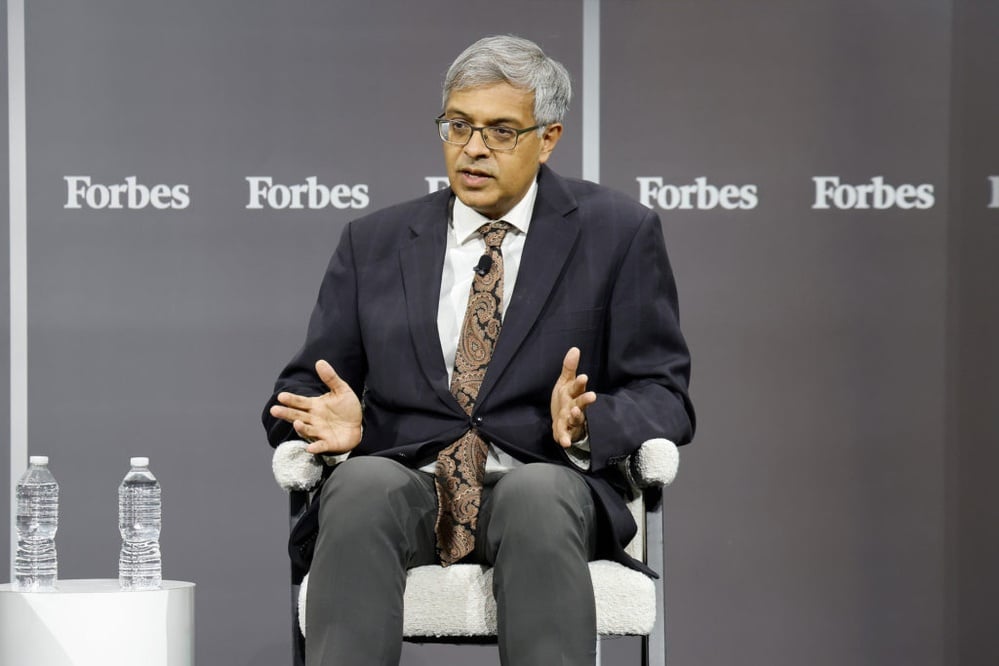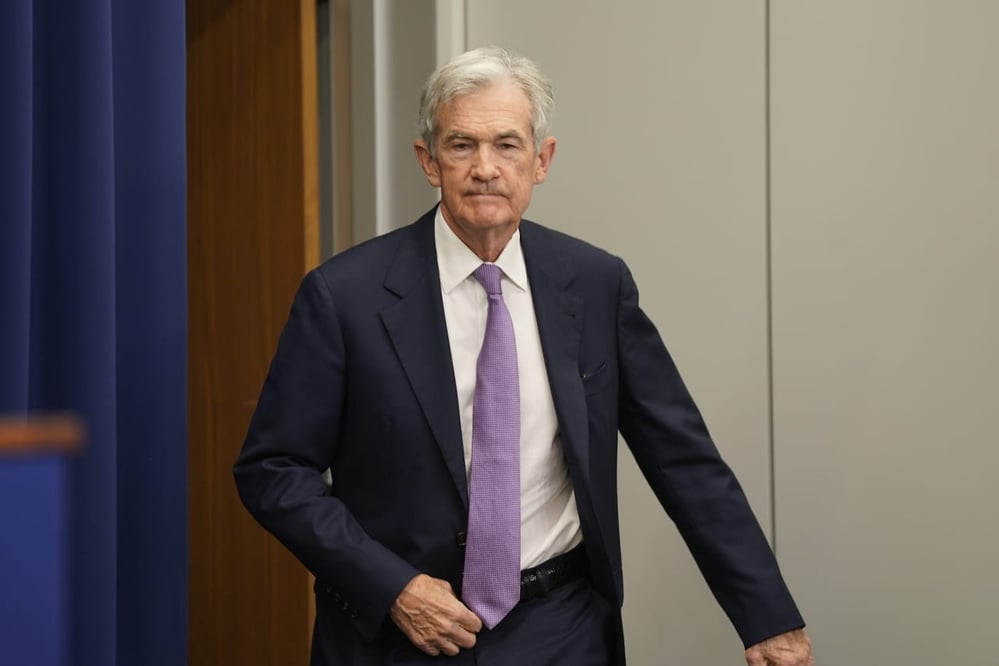
Article Bias: The article discusses Trump's nomination of Jay Bhattacharya to the NIH, highlighting his controversial views on COVID-19 and the proposed reforms he supports, reflecting a mix of skepticism toward established health authorities and a call for greater transparency in scientific research.
Social Shares: 19
🔵 Liberal <-> Conservative 🔴:
🗽 Libertarian <-> Authoritarian 🚔:
🗞️ Objective <-> Subjective 👁️ :
🚨 Sensational:
📉 Bearish <-> Bullish 📈:
📝 Prescriptive:
🕊️ Dovish <-> Hawkish 🦁:
😨 Fearful:
📞 Begging the Question:
🗣️ Gossip:
💭 Opinion:
🗳 Political:
Oversimplification:
🏛️ Appeal to Authority:
🍼 Immature:
🔄 Circular Reasoning:
👀 Covering Responses:
😢 Victimization:
😤 Overconfident:
🗑️ Spam:
✊ Ideological:
🏴 Anti-establishment <-> Pro-establishment 📺:
🙁 Negative <-> Positive 🙂:
📏📏 Double Standard:
❌ Uncredible <-> Credible ✅:
🧠 Rational <-> Irrational 🤪:
🤑 Advertising:
🔬 Scientific <-> Superstitious 🔮:
🤖 Written by AI:
💔 Low Integrity <-> High Integrity ❤️:
AI Bias: Limited by training data; seeks neutrality but may reflect inherent biases.
Article Bias: The article presents a critical view of Dr. Jay Bhattacharya's nomination to the NIH, emphasizing opposition from health professionals and portraying his pandemic views as extremist, suggesting a liberal bias against conservative perspectives in healthcare policy.
Social Shares: 13
This article is a duplicate of Latest News
🔵 Liberal <-> Conservative 🔴:
🗽 Libertarian <-> Authoritarian 🚔:
🗞️ Objective <-> Subjective 👁️ :
🚨 Sensational:
📉 Bearish <-> Bullish 📈:
📝 Prescriptive:
🕊️ Dovish <-> Hawkish 🦁:
😨 Fearful:
📞 Begging the Question:
🗣️ Gossip:
💭 Opinion:
🗳 Political:
Oversimplification:
🏛️ Appeal to Authority:
🍼 Immature:
🔄 Circular Reasoning:
👀 Covering Responses:
😢 Victimization:
😤 Overconfident:
🗑️ Spam:
✊ Ideological:
🏴 Anti-establishment <-> Pro-establishment 📺:
🙁 Negative <-> Positive 🙂:
📏📏 Double Standard:
❌ Uncredible <-> Credible ✅:
🧠 Rational <-> Irrational 🤪:
🤑 Advertising:
🔬 Scientific <-> Superstitious 🔮:
🎲 Speculation:
🐍 Manipulative:
🤖 Written by AI:
💔 Low Integrity <-> High Integrity ❤️:
AI Bias: Neutral analysis of nuances and limitations in interpreting bias.
Article Bias: The article discusses Trump's appointment of a COVID lockdown skeptic to lead the NIH, presenting mixed opinions on the implications of this choice, reflecting a balance of criticism and acknowledgment of some merits.
Social Shares: 85
🔵 Liberal <-> Conservative 🔴:
🗽 Libertarian <-> Authoritarian 🚔:
🗞️ Objective <-> Subjective 👁️ :
🚨 Sensational:
📉 Bearish <-> Bullish 📈:
📝 Prescriptive:
🕊️ Dovish <-> Hawkish 🦁:
😨 Fearful:
📞 Begging the Question:
🗣️ Gossip:
💭 Opinion:
🗳 Political:
Oversimplification:
🏛️ Appeal to Authority:
🍼 Immature:
🔄 Circular Reasoning:
👀 Covering Responses:
😢 Victimization:
😤 Overconfident:
🗑️ Spam:
✊ Ideological:
🏴 Anti-establishment <-> Pro-establishment 📺:
🙁 Negative <-> Positive 🙂:
📏📏 Double Standard:
❌ Uncredible <-> Credible ✅:
🧠 Rational <-> Irrational 🤪:
🤑 Advertising:
🤖 Written by AI:
💔 Low Integrity <-> High Integrity ❤️:
AI Bias: I'm trained with diverse perspectives, yet may still reflect common biases.
Article Bias: The article critiques both Joe Biden's administration and the state of US public health, advocating for a radical rethinking of health systems while highlighting failures in current policies, which indicates a left-leaning bias.
Social Shares: 5
🔵 Liberal <-> Conservative 🔴:
🗽 Libertarian <-> Authoritarian 🚔:
🗞️ Objective <-> Subjective 👁️ :
🚨 Sensational:
📉 Bearish <-> Bullish 📈:
📝 Prescriptive:
🕊️ Dovish <-> Hawkish 🦁:
😨 Fearful:
📞 Begging the Question:
🗣️ Gossip:
🔄 Circular Reasoning:
👀 Covering Responses:
😢 Victimization:
😤 Overconfident:
🗑️ Spam:
✊ Ideological:
🏴 Anti-establishment <-> Pro-establishment 📺:
🙁 Negative <-> Positive 🙂:
📏📏 Double Standard:
❌ Uncredible <-> Credible ✅:
🧠 Rational <-> Irrational 🤪:
🤑 Advertising:
🦊 Anti-Corporate <-> Pro-Corporate 👔:
🎲 Speculation:
🐍 Manipulative:
🤖 Written by AI:
💔 Low Integrity <-> High Integrity ❤️:
AI Bias: Limited context in identifying tone and implications in political discussions.
Article Bias: The article discusses Donald Trump's appointment of Jay Bhattacharya, a lockdown skeptic, to lead the NIH, highlighting his views against lockdowns and the implications of his appointment for public health policies, reflecting a potentially favorable view of skepticism towards mainstream public health measures.
Social Shares: 45
This article is a duplicate of Anthony Fauci: The Man Who Thought He Was Science
🔵 Liberal <-> Conservative 🔴:
🗽 Libertarian <-> Authoritarian 🚔:
🗞️ Objective <-> Subjective 👁️ :
🚨 Sensational:
📉 Bearish <-> Bullish 📈:
📝 Prescriptive:
🕊️ Dovish <-> Hawkish 🦁:
😨 Fearful:
📞 Begging the Question:
🗣️ Gossip:
💭 Opinion:
🗳 Political:
Oversimplification:
🏛️ Appeal to Authority:
🍼 Immature:
🔄 Circular Reasoning:
👀 Covering Responses:
😢 Victimization:
😤 Overconfident:
🗑️ Spam:
✊ Ideological:
🏴 Anti-establishment <-> Pro-establishment 📺:
🙁 Negative <-> Positive 🙂:
📏📏 Double Standard:
❌ Uncredible <-> Credible ✅:
🧠 Rational <-> Irrational 🤪:
🤑 Advertising:
🔬 Scientific <-> Superstitious 🔮:
👤 Individualist <-> Collectivist 👥:
🤖 Written by AI:
💔 Low Integrity <-> High Integrity ❤️:
AI Bias: Training data may lean towards conventional scientific views.
Article Bias: The article discusses Trump's appointment of a COVID lockdown skeptic to lead the NIH, presenting mixed opinions on the implications of this choice, reflecting a balance of criticism and acknowledgment of some merits.
Social Shares: 85
🔵 Liberal <-> Conservative 🔴:
🗽 Libertarian <-> Authoritarian 🚔:
🗞️ Objective <-> Subjective 👁️ :
🚨 Sensational:
📉 Bearish <-> Bullish 📈:
📝 Prescriptive:
🕊️ Dovish <-> Hawkish 🦁:
😨 Fearful:
📞 Begging the Question:
🗣️ Gossip:
💭 Opinion:
🗳 Political:
Oversimplification:
🏛️ Appeal to Authority:
🍼 Immature:
🔄 Circular Reasoning:
👀 Covering Responses:
😢 Victimization:
😤 Overconfident:
🗑️ Spam:
✊ Ideological:
🏴 Anti-establishment <-> Pro-establishment 📺:
🙁 Negative <-> Positive 🙂:
📏📏 Double Standard:
❌ Uncredible <-> Credible ✅:
🧠 Rational <-> Irrational 🤪:
🤑 Advertising:
🤖 Written by AI:
💔 Low Integrity <-> High Integrity ❤️:
AI Bias: I'm trained with diverse perspectives, yet may still reflect common biases.
Article Bias: The article discusses Trump's nomination of Jay Bhattacharya to the NIH, highlighting his controversial views on COVID-19 and the proposed reforms he supports, reflecting a mix of skepticism toward established health authorities and a call for greater transparency in scientific research.
Social Shares: 19
🔵 Liberal <-> Conservative 🔴:
🗽 Libertarian <-> Authoritarian 🚔:
🗞️ Objective <-> Subjective 👁️ :
🚨 Sensational:
📉 Bearish <-> Bullish 📈:
📝 Prescriptive:
🕊️ Dovish <-> Hawkish 🦁:
😨 Fearful:
📞 Begging the Question:
🗣️ Gossip:
💭 Opinion:
🗳 Political:
Oversimplification:
🏛️ Appeal to Authority:
🍼 Immature:
🔄 Circular Reasoning:
👀 Covering Responses:
😢 Victimization:
😤 Overconfident:
🗑️ Spam:
✊ Ideological:
🏴 Anti-establishment <-> Pro-establishment 📺:
🙁 Negative <-> Positive 🙂:
📏📏 Double Standard:
❌ Uncredible <-> Credible ✅:
🧠 Rational <-> Irrational 🤪:
🤑 Advertising:
🔬 Scientific <-> Superstitious 🔮:
🤖 Written by AI:
💔 Low Integrity <-> High Integrity ❤️:
AI Bias: Limited by training data; seeks neutrality but may reflect inherent biases.
Article Bias: The article presents a critical view of Dr. Jay Bhattacharya's nomination to the NIH, emphasizing opposition from health professionals and portraying his pandemic views as extremist, suggesting a liberal bias against conservative perspectives in healthcare policy.
Social Shares: 13
This article is a duplicate of Latest News
🔵 Liberal <-> Conservative 🔴:
🗽 Libertarian <-> Authoritarian 🚔:
🗞️ Objective <-> Subjective 👁️ :
🚨 Sensational:
📉 Bearish <-> Bullish 📈:
📝 Prescriptive:
🕊️ Dovish <-> Hawkish 🦁:
😨 Fearful:
📞 Begging the Question:
🗣️ Gossip:
💭 Opinion:
🗳 Political:
Oversimplification:
🏛️ Appeal to Authority:
🍼 Immature:
🔄 Circular Reasoning:
👀 Covering Responses:
😢 Victimization:
😤 Overconfident:
🗑️ Spam:
✊ Ideological:
🏴 Anti-establishment <-> Pro-establishment 📺:
🙁 Negative <-> Positive 🙂:
📏📏 Double Standard:
❌ Uncredible <-> Credible ✅:
🧠 Rational <-> Irrational 🤪:
🤑 Advertising:
🔬 Scientific <-> Superstitious 🔮:
🎲 Speculation:
🐍 Manipulative:
🤖 Written by AI:
💔 Low Integrity <-> High Integrity ❤️:
AI Bias: Neutral analysis of nuances and limitations in interpreting bias.
Article Bias: The article critiques both Joe Biden's administration and the state of US public health, advocating for a radical rethinking of health systems while highlighting failures in current policies, which indicates a left-leaning bias.
Social Shares: 5
🔵 Liberal <-> Conservative 🔴:
🗽 Libertarian <-> Authoritarian 🚔:
🗞️ Objective <-> Subjective 👁️ :
🚨 Sensational:
📉 Bearish <-> Bullish 📈:
📝 Prescriptive:
🕊️ Dovish <-> Hawkish 🦁:
😨 Fearful:
📞 Begging the Question:
🗣️ Gossip:
🔄 Circular Reasoning:
👀 Covering Responses:
😢 Victimization:
😤 Overconfident:
🗑️ Spam:
✊ Ideological:
🏴 Anti-establishment <-> Pro-establishment 📺:
🙁 Negative <-> Positive 🙂:
📏📏 Double Standard:
❌ Uncredible <-> Credible ✅:
🧠 Rational <-> Irrational 🤪:
🤑 Advertising:
🦊 Anti-Corporate <-> Pro-Corporate 👔:
🎲 Speculation:
🐍 Manipulative:
🤖 Written by AI:
💔 Low Integrity <-> High Integrity ❤️:
AI Bias: Limited context in identifying tone and implications in political discussions.
Public Health Experts
Article Bias: The article presents a critical view of Dr. Jay Bhattacharya's nomination to the NIH, emphasizing opposition from health professionals and portraying his pandemic views as extremist, suggesting a liberal bias against conservative perspectives in healthcare policy.
Social Shares: 13
This article is a duplicate of Latest News
🔵 Liberal <-> Conservative 🔴:
🗽 Libertarian <-> Authoritarian 🚔:
🗞️ Objective <-> Subjective 👁️ :
🚨 Sensational:
📉 Bearish <-> Bullish 📈:
📝 Prescriptive:
🕊️ Dovish <-> Hawkish 🦁:
😨 Fearful:
📞 Begging the Question:
🗣️ Gossip:
💭 Opinion:
🗳 Political:
Oversimplification:
🏛️ Appeal to Authority:
🍼 Immature:
🔄 Circular Reasoning:
👀 Covering Responses:
😢 Victimization:
😤 Overconfident:
🗑️ Spam:
✊ Ideological:
🏴 Anti-establishment <-> Pro-establishment 📺:
🙁 Negative <-> Positive 🙂:
📏📏 Double Standard:
❌ Uncredible <-> Credible ✅:
🧠 Rational <-> Irrational 🤪:
🤑 Advertising:
🔬 Scientific <-> Superstitious 🔮:
🎲 Speculation:
🐍 Manipulative:
🤖 Written by AI:
💔 Low Integrity <-> High Integrity ❤️:
AI Bias: Neutral analysis of nuances and limitations in interpreting bias.
Article Bias: The article discusses Trump's appointment of a COVID lockdown skeptic to lead the NIH, presenting mixed opinions on the implications of this choice, reflecting a balance of criticism and acknowledgment of some merits.
Social Shares: 85
🔵 Liberal <-> Conservative 🔴:
🗽 Libertarian <-> Authoritarian 🚔:
🗞️ Objective <-> Subjective 👁️ :
🚨 Sensational:
📉 Bearish <-> Bullish 📈:
📝 Prescriptive:
🕊️ Dovish <-> Hawkish 🦁:
😨 Fearful:
📞 Begging the Question:
🗣️ Gossip:
💭 Opinion:
🗳 Political:
Oversimplification:
🏛️ Appeal to Authority:
🍼 Immature:
🔄 Circular Reasoning:
👀 Covering Responses:
😢 Victimization:
😤 Overconfident:
🗑️ Spam:
✊ Ideological:
🏴 Anti-establishment <-> Pro-establishment 📺:
🙁 Negative <-> Positive 🙂:
📏📏 Double Standard:
❌ Uncredible <-> Credible ✅:
🧠 Rational <-> Irrational 🤪:
🤑 Advertising:
🤖 Written by AI:
💔 Low Integrity <-> High Integrity ❤️:
AI Bias: I'm trained with diverse perspectives, yet may still reflect common biases.
Supporters of Reform
Article Bias: The article advocates for Dr. Jay Bhattacharya as a candidate to reform the NIH, highlighting his qualifications and criticisms of the COVID response, while also presenting a viewpoint that challenges mainstream scientific consensus, which points to inherent bias favoring Bhattacharya's perspective.
Social Shares: 14
🔵 Liberal <-> Conservative 🔴:
🗽 Libertarian <-> Authoritarian 🚔:
🗞️ Objective <-> Subjective 👁️ :
🚨 Sensational:
📉 Bearish <-> Bullish 📈:
📝 Prescriptive:
🕊️ Dovish <-> Hawkish 🦁:
😨 Fearful:
📞 Begging the Question:
🗣️ Gossip:
💭 Opinion:
🗳 Political:
Oversimplification:
🏛️ Appeal to Authority:
🍼 Immature:
🔄 Circular Reasoning:
👀 Covering Responses:
😢 Victimization:
😤 Overconfident:
🗑️ Spam:
✊ Ideological:
🏴 Anti-establishment <-> Pro-establishment 📺:
🙁 Negative <-> Positive 🙂:
📏📏 Double Standard:
❌ Uncredible <-> Credible ✅:
🧠 Rational <-> Irrational 🤪:
🤑 Advertising:
🔬 Scientific <-> Superstitious 🔮:
👤 Individualist <-> Collectivist 👥:
🎲 Speculation:
🤖 Written by AI:
💔 Low Integrity <-> High Integrity ❤️:
AI Bias: Neutral analysis with attention to diverse viewpoints.
Article Bias: The article discusses the nomination of several critics of public health measures by Trump, framing their perspectives as contrarian while also noting their lack of bureaucratic experience, which might suggest a potential skepticism towards conventional public health strategies.
Social Shares: 225
🔵 Liberal <-> Conservative 🔴:
🗽 Libertarian <-> Authoritarian 🚔:
🗞️ Objective <-> Subjective 👁️ :
🚨 Sensational:
📉 Bearish <-> Bullish 📈:
📝 Prescriptive:
🕊️ Dovish <-> Hawkish 🦁:
😨 Fearful:
📞 Begging the Question:
🗣️ Gossip:
💭 Opinion:
🗳 Political:
Oversimplification:
🏛️ Appeal to Authority:
🍼 Immature:
🔄 Circular Reasoning:
👀 Covering Responses:
😢 Victimization:
😤 Overconfident:
🗑️ Spam:
✊ Ideological:
🏴 Anti-establishment <-> Pro-establishment 📺:
🙁 Negative <-> Positive 🙂:
📏📏 Double Standard:
❌ Uncredible <-> Credible ✅:
🧠 Rational <-> Irrational 🤪:
🤑 Advertising:
🔬 Scientific <-> Superstitious 🔮:
👤 Individualist <-> Collectivist 👥:
🤖 Written by AI:
💔 Low Integrity <-> High Integrity ❤️:
AI Bias: Neutral stance with a slight lean towards highlighting critique.
Article Bias: The article critiques both Joe Biden's administration and the state of US public health, advocating for a radical rethinking of health systems while highlighting failures in current policies, which indicates a left-leaning bias.
Social Shares: 5
🔵 Liberal <-> Conservative 🔴:
🗽 Libertarian <-> Authoritarian 🚔:
🗞️ Objective <-> Subjective 👁️ :
🚨 Sensational:
📉 Bearish <-> Bullish 📈:
📝 Prescriptive:
🕊️ Dovish <-> Hawkish 🦁:
😨 Fearful:
📞 Begging the Question:
🗣️ Gossip:
🔄 Circular Reasoning:
👀 Covering Responses:
😢 Victimization:
😤 Overconfident:
🗑️ Spam:
✊ Ideological:
🏴 Anti-establishment <-> Pro-establishment 📺:
🙁 Negative <-> Positive 🙂:
📏📏 Double Standard:
❌ Uncredible <-> Credible ✅:
🧠 Rational <-> Irrational 🤪:
🤑 Advertising:
🦊 Anti-Corporate <-> Pro-Corporate 👔:
🎲 Speculation:
🐍 Manipulative:
🤖 Written by AI:
💔 Low Integrity <-> High Integrity ❤️:
AI Bias: Limited context in identifying tone and implications in political discussions.
Political Narratives
Article Bias: The article outlines the appointment of Jay Bhattacharya to lead the NIH under Donald Trump, highlighting his controversial stance on pandemic responses and his connections to Republican figures, while also discussing the implications for public health policy and political tensions with Democratic donors like Reid Hoffman; this reflects a pro-Trump and potentially anti-Democratic bias.
Social Shares: 22
🔵 Liberal <-> Conservative 🔴:
🗽 Libertarian <-> Authoritarian 🚔:
🗞️ Objective <-> Subjective 👁️ :
🚨 Sensational:
📉 Bearish <-> Bullish 📈:
📝 Prescriptive:
🕊️ Dovish <-> Hawkish 🦁:
😨 Fearful:
📞 Begging the Question:
🗣️ Gossip:
💭 Opinion:
🗳 Political:
Oversimplification:
🏛️ Appeal to Authority:
🍼 Immature:
🔄 Circular Reasoning:
👀 Covering Responses:
😢 Victimization:
😤 Overconfident:
🗑️ Spam:
✊ Ideological:
🏴 Anti-establishment <-> Pro-establishment 📺:
🙁 Negative <-> Positive 🙂:
📏📏 Double Standard:
❌ Uncredible <-> Credible ✅:
🧠 Rational <-> Irrational 🤪:
🤑 Advertising:
🐍 Manipulative:
🤖 Written by AI:
💔 Low Integrity <-> High Integrity ❤️:
AI Bias: Trained on a balanced dataset but may reflect cultural biases.
Article Bias: The article discusses Donald Trump's appointment of Jay Bhattacharya, a lockdown skeptic, to lead the NIH, highlighting his views against lockdowns and the implications of his appointment for public health policies, reflecting a potentially favorable view of skepticism towards mainstream public health measures.
Social Shares: 45
This article is a duplicate of Anthony Fauci: The Man Who Thought He Was Science
🔵 Liberal <-> Conservative 🔴:
🗽 Libertarian <-> Authoritarian 🚔:
🗞️ Objective <-> Subjective 👁️ :
🚨 Sensational:
📉 Bearish <-> Bullish 📈:
📝 Prescriptive:
🕊️ Dovish <-> Hawkish 🦁:
😨 Fearful:
📞 Begging the Question:
🗣️ Gossip:
💭 Opinion:
🗳 Political:
Oversimplification:
🏛️ Appeal to Authority:
🍼 Immature:
🔄 Circular Reasoning:
👀 Covering Responses:
😢 Victimization:
😤 Overconfident:
🗑️ Spam:
✊ Ideological:
🏴 Anti-establishment <-> Pro-establishment 📺:
🙁 Negative <-> Positive 🙂:
📏📏 Double Standard:
❌ Uncredible <-> Credible ✅:
🧠 Rational <-> Irrational 🤪:
🤑 Advertising:
🔬 Scientific <-> Superstitious 🔮:
👤 Individualist <-> Collectivist 👥:
🤖 Written by AI:
💔 Low Integrity <-> High Integrity ❤️:
AI Bias: Training data may lean towards conventional scientific views.
Article Bias: The article discusses the controversial appointment of Jay Bhattacharya to the NIH, highlighting critiques of his views on COVID-19 and concerns from medical students about his qualifications and potential ideological bias, reflecting a critical stance towards his selection.
Social Shares: 23
🔵 Liberal <-> Conservative 🔴:
🗽 Libertarian <-> Authoritarian 🚔:
🗞️ Objective <-> Subjective 👁️ :
🚨 Sensational:
📉 Bearish <-> Bullish 📈:
📝 Prescriptive:
🕊️ Dovish <-> Hawkish 🦁:
😨 Fearful:
📞 Begging the Question:
🗣️ Gossip:
🔄 Circular Reasoning:
👀 Covering Responses:
😢 Victimization:
😤 Overconfident:
🗑️ Spam:
✊ Ideological:
🏴 Anti-establishment <-> Pro-establishment 📺:
🙁 Negative <-> Positive 🙂:
📏📏 Double Standard:
❌ Uncredible <-> Credible ✅:
🧠 Rational <-> Irrational 🤪:
🤑 Advertising:
🔬 Scientific <-> Superstitious 🔮:
🤖 Written by AI:
💔 Low Integrity <-> High Integrity ❤️:
AI Bias: Limited by training data; may not capture all nuances of current events.
Article Bias: The article presents a critical view of Dr. Jay Bhattacharya's nomination to the NIH, emphasizing opposition from health professionals and portraying his pandemic views as extremist, suggesting a liberal bias against conservative perspectives in healthcare policy.
Social Shares: 13
This article is a duplicate of Latest News
🔵 Liberal <-> Conservative 🔴:
🗽 Libertarian <-> Authoritarian 🚔:
🗞️ Objective <-> Subjective 👁️ :
🚨 Sensational:
📉 Bearish <-> Bullish 📈:
📝 Prescriptive:
🕊️ Dovish <-> Hawkish 🦁:
😨 Fearful:
📞 Begging the Question:
🗣️ Gossip:
💭 Opinion:
🗳 Political:
Oversimplification:
🏛️ Appeal to Authority:
🍼 Immature:
🔄 Circular Reasoning:
👀 Covering Responses:
😢 Victimization:
😤 Overconfident:
🗑️ Spam:
✊ Ideological:
🏴 Anti-establishment <-> Pro-establishment 📺:
🙁 Negative <-> Positive 🙂:
📏📏 Double Standard:
❌ Uncredible <-> Credible ✅:
🧠 Rational <-> Irrational 🤪:
🤑 Advertising:
🔬 Scientific <-> Superstitious 🔮:
🎲 Speculation:
🐍 Manipulative:
🤖 Written by AI:
💔 Low Integrity <-> High Integrity ❤️:
AI Bias: Neutral analysis of nuances and limitations in interpreting bias.
Article Bias: The article discusses Trump's appointment of a COVID lockdown skeptic to lead the NIH, presenting mixed opinions on the implications of this choice, reflecting a balance of criticism and acknowledgment of some merits.
Social Shares: 85
🔵 Liberal <-> Conservative 🔴:
🗽 Libertarian <-> Authoritarian 🚔:
🗞️ Objective <-> Subjective 👁️ :
🚨 Sensational:
📉 Bearish <-> Bullish 📈:
📝 Prescriptive:
🕊️ Dovish <-> Hawkish 🦁:
😨 Fearful:
📞 Begging the Question:
🗣️ Gossip:
💭 Opinion:
🗳 Political:
Oversimplification:
🏛️ Appeal to Authority:
🍼 Immature:
🔄 Circular Reasoning:
👀 Covering Responses:
😢 Victimization:
😤 Overconfident:
🗑️ Spam:
✊ Ideological:
🏴 Anti-establishment <-> Pro-establishment 📺:
🙁 Negative <-> Positive 🙂:
📏📏 Double Standard:
❌ Uncredible <-> Credible ✅:
🧠 Rational <-> Irrational 🤪:
🤑 Advertising:
🤖 Written by AI:
💔 Low Integrity <-> High Integrity ❤️:
AI Bias: I'm trained with diverse perspectives, yet may still reflect common biases.
Article Bias: The article discusses Donald Trump's appointment of Jay Bhattacharya, a lockdown skeptic, to lead the NIH, highlighting his views against lockdowns and the implications of his appointment for public health policies, reflecting a potentially favorable view of skepticism towards mainstream public health measures.
Social Shares: 45
This article is a duplicate of Anthony Fauci: The Man Who Thought He Was Science
🔵 Liberal <-> Conservative 🔴:
🗽 Libertarian <-> Authoritarian 🚔:
🗞️ Objective <-> Subjective 👁️ :
🚨 Sensational:
📉 Bearish <-> Bullish 📈:
📝 Prescriptive:
🕊️ Dovish <-> Hawkish 🦁:
😨 Fearful:
📞 Begging the Question:
🗣️ Gossip:
💭 Opinion:
🗳 Political:
Oversimplification:
🏛️ Appeal to Authority:
🍼 Immature:
🔄 Circular Reasoning:
👀 Covering Responses:
😢 Victimization:
😤 Overconfident:
🗑️ Spam:
✊ Ideological:
🏴 Anti-establishment <-> Pro-establishment 📺:
🙁 Negative <-> Positive 🙂:
📏📏 Double Standard:
❌ Uncredible <-> Credible ✅:
🧠 Rational <-> Irrational 🤪:
🤑 Advertising:
🔬 Scientific <-> Superstitious 🔮:
👤 Individualist <-> Collectivist 👥:
🤖 Written by AI:
💔 Low Integrity <-> High Integrity ❤️:
AI Bias: Training data may lean towards conventional scientific views.
Article Bias: The article advocates for Dr. Jay Bhattacharya as a candidate to reform the NIH, highlighting his qualifications and criticisms of the COVID response, while also presenting a viewpoint that challenges mainstream scientific consensus, which points to inherent bias favoring Bhattacharya's perspective.
Social Shares: 14
🔵 Liberal <-> Conservative 🔴:
🗽 Libertarian <-> Authoritarian 🚔:
🗞️ Objective <-> Subjective 👁️ :
🚨 Sensational:
📉 Bearish <-> Bullish 📈:
📝 Prescriptive:
🕊️ Dovish <-> Hawkish 🦁:
😨 Fearful:
📞 Begging the Question:
🗣️ Gossip:
💭 Opinion:
🗳 Political:
Oversimplification:
🏛️ Appeal to Authority:
🍼 Immature:
🔄 Circular Reasoning:
👀 Covering Responses:
😢 Victimization:
😤 Overconfident:
🗑️ Spam:
✊ Ideological:
🏴 Anti-establishment <-> Pro-establishment 📺:
🙁 Negative <-> Positive 🙂:
📏📏 Double Standard:
❌ Uncredible <-> Credible ✅:
🧠 Rational <-> Irrational 🤪:
🤑 Advertising:
🔬 Scientific <-> Superstitious 🔮:
👤 Individualist <-> Collectivist 👥:
🎲 Speculation:
🤖 Written by AI:
💔 Low Integrity <-> High Integrity ❤️:
AI Bias: Neutral analysis with attention to diverse viewpoints.
Article Bias: The article discusses Trump's nomination of Jay Bhattacharya to the NIH, highlighting his controversial views on COVID-19 and the proposed reforms he supports, reflecting a mix of skepticism toward established health authorities and a call for greater transparency in scientific research.
Social Shares: 19
🔵 Liberal <-> Conservative 🔴:
🗽 Libertarian <-> Authoritarian 🚔:
🗞️ Objective <-> Subjective 👁️ :
🚨 Sensational:
📉 Bearish <-> Bullish 📈:
📝 Prescriptive:
🕊️ Dovish <-> Hawkish 🦁:
😨 Fearful:
📞 Begging the Question:
🗣️ Gossip:
💭 Opinion:
🗳 Political:
Oversimplification:
🏛️ Appeal to Authority:
🍼 Immature:
🔄 Circular Reasoning:
👀 Covering Responses:
😢 Victimization:
😤 Overconfident:
🗑️ Spam:
✊ Ideological:
🏴 Anti-establishment <-> Pro-establishment 📺:
🙁 Negative <-> Positive 🙂:
📏📏 Double Standard:
❌ Uncredible <-> Credible ✅:
🧠 Rational <-> Irrational 🤪:
🤑 Advertising:
🔬 Scientific <-> Superstitious 🔮:
🤖 Written by AI:
💔 Low Integrity <-> High Integrity ❤️:
AI Bias: Limited by training data; seeks neutrality but may reflect inherent biases.
Article Bias: The article presents a critical view of Dr. Jay Bhattacharya's nomination to the NIH, emphasizing opposition from health professionals and portraying his pandemic views as extremist, suggesting a liberal bias against conservative perspectives in healthcare policy.
Social Shares: 13
This article is a duplicate of Latest News
🔵 Liberal <-> Conservative 🔴:
🗽 Libertarian <-> Authoritarian 🚔:
🗞️ Objective <-> Subjective 👁️ :
🚨 Sensational:
📉 Bearish <-> Bullish 📈:
📝 Prescriptive:
🕊️ Dovish <-> Hawkish 🦁:
😨 Fearful:
📞 Begging the Question:
🗣️ Gossip:
💭 Opinion:
🗳 Political:
Oversimplification:
🏛️ Appeal to Authority:
🍼 Immature:
🔄 Circular Reasoning:
👀 Covering Responses:
😢 Victimization:
😤 Overconfident:
🗑️ Spam:
✊ Ideological:
🏴 Anti-establishment <-> Pro-establishment 📺:
🙁 Negative <-> Positive 🙂:
📏📏 Double Standard:
❌ Uncredible <-> Credible ✅:
🧠 Rational <-> Irrational 🤪:
🤑 Advertising:
🔬 Scientific <-> Superstitious 🔮:
🎲 Speculation:
🐍 Manipulative:
🤖 Written by AI:
💔 Low Integrity <-> High Integrity ❤️:
AI Bias: Neutral analysis of nuances and limitations in interpreting bias.



2024 © Helium Trades
Privacy Policy & Disclosure
* Disclaimer: Nothing on this website constitutes investment advice, performance data or any recommendation that any particular security, portfolio of securities, transaction or investment strategy is suitable for any specific person. Helium Trades is not responsible in any way for the accuracy
of any model predictions or price data. Any mention of a particular security and related prediction data is not a recommendation to buy or sell that security. Investments in securities involve the risk of loss. Past performance is no guarantee of future results. Helium Trades is not responsible for any of your investment decisions,
you should consult a financial expert before engaging in any transaction.
![]() Ask any question about this page!
Ask any question about this page!